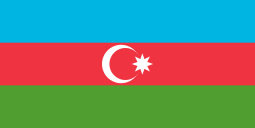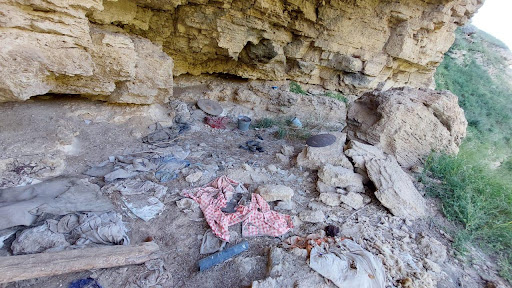
"He said: I'm staying, you go, you will meet Armenians..." - NEW PROJECT - AUTHOR VUSALA MAMMADOVA
10 October 2022
The issue of the fate of Azerbaijani citizens who went missing, were captured or taken hostage during the military aggression of Armenia against Azerbaijan remains one of the important unresolved issues on the agenda of the talks. Although this issue was raised every time in the course of diplomatic contacts after the 44-day Patriotic War, so far unsuccessfully due to the efforts of the Armenian side to hide it and evade cooperation.
As of December 1, 2020, the number of registered missing people is 3,890, according to the Working Group of the State Commission on the Affairs of Captured and Missing Persons.
There is a need for clarifying materials about the specific circumstances and battles in which these people went missing, or information that could at least shed some light on their subsequent fate. A new Media Development Center project called “Our Missing: Each of 4,000” provides for the preparation of journalistic investigations, in which the circumstances of the individual or collective disappearances of these people are described in detail from the language of eyewitnesses, as well as on the basis of information from official sources, are translated into several languages and distributed.
Thus, "Pressklub.az" starts a series of articles within the framework of the "Missing" project, presented by the well-known journalist Vusala Mammadova.
Returning to the lands liberated from occupation, a person first of all turns to the house where he was born and raised. It is such an inexplicable feeling that a place of which there is nothing left is called home. You sit on dry ground and say "I'm home"…
However, there are people who, having returned home, wander everywhere in the hope of finding not only the place of their home, but at least one single sign of their relative left here. These are the families of the missing. In this project, we will get to know these families, learn about our people who went missing in the First Karabakh War, and try to create the last portrait of our compatriots, whose fate has not yet been revealed.
My first interviewee, 74-year-old poet Alekper Sonmez, began the conversation by describing his father, Alesker Kazymov.
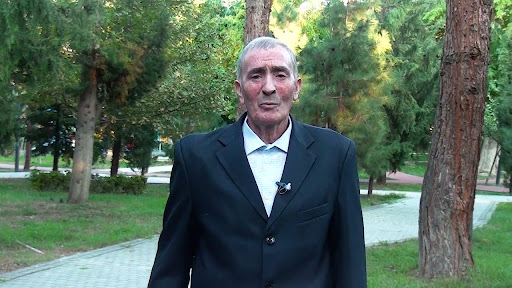
- I do not have a photograph of my father, but he is in my memory, as if alive! I would like you to look through my eyes and see what kind of person he was. He was tall, about 180-190 cm. With a broad back, weighing about 80 kg. He was dark-haired, he had small brown eyes, sparse gray hair ... He had a mustache, but he did not grow a beard ... A sloping chin, nose, ears, arms, legs ... Yes, my father had long legs, he took big steps. When he came from far away, everyone in the village would recognize him by his walk... His white dentures were a bit too big for his mouth. He mainly used his right hand. I don't know his blood type... He had no scars, no wounds, no tattoos, no birthmarks. I told all this to government agencies and international organizations …
- How old was your father? In some documents it is written that he was born in 1918, in others - in 1899 …
- Although it is written differently in the documents, my father Kazymov Alesker Alesker oglu himself said that he was born in the village of Bashlybel of the Kalbajar region in 1902. Studied for 7 years in high school. At that time there was no collective farm, he was engaged in his own farming.
- He also took part in the war…
- Yes, my father was called up for military service in 1938 from the military commissariat of the Lachin region. He did his military service in Ukraine. He was in the cavalry, that is, a mounted soldier. When the Soviet Union attacked eastern Poland in September 1939, my father was also in the war. Then he participated in the Winter War - the Soviet-Finnish war. After the end of the war, he was demobilized from the army and returned to his native village of Bashlybel.
- But then he again participated in the war.
- In 1941, the Great Patriotic War began. On December 18, my father was drafted into the army from the Kalbajar military commissariat. He was an active participant in the Great Patriotic War. After the end of the war, he returned to the village and took up construction on the collective farm. My father was one of the most active participants in the opening of the Istisu-Terter road. At that time there were no machines, manual labor was used for sowing and harvesting grain. According to his own words, during the day he cut and tied 250 armfuls of grain ...
- What did he tell about the war?
- My father was such an honest man that... He told me many memories of those days. I will never forget one of them…
- Could you tell me too?
- Of course! He said that one evening, returning to the barracks, he saw a wallet fall on the floor, and picked it up. When he went to bed in the evening, he opened it and saw that there was a lot of money, a military ID and a family photo. He learned that it was a soldier. But what to do? How does he know who it is? He thought that if he placed an ad, the owner would be found. He wrote an ad on a piece of paper, took it and pasted it on the doors of the dining room and the barracks. When he returned, he saw that it had been torn off. He wrote again, and the ad was torn down again. Thus, he wrote and pasted ads on the door for almost two months.
One evening he heard a call: “Kyazymov Alesker!” He was taken to the commander. There one person spoke Azerbaijani. He asked, “Brother, why do you annoy people? What do you hang on the door every day? Because of this, I drove here for three days. They called me to come and ask, what is your request? What do you want?"
The father said: "I found such an object, I want to deliver it to the owner." He replied: “Brother, you raised not only us, but the whole of Azerbaijan in the eyes of the people here. Well done!"
- After that, it became easier to find that soldier.
- Father said that on the same day the soldier was found and called, and he himself was thanked. They asked if he needed anything. My father said that he had great difficulties with the Russian language. He didn't understand a word. The Azerbaijani said: "Bring a piece of paper and a pen, I will tell you a few words, so you will learn everything." He wrote on paper "what is it called". He said to learn these words, and when it is difficult, point to an object and ask, then they will tell you that this is a spoon, this is a knife, this is bread …
- Just think, our ancestors had to defend the "motherland", the language of which they did not know …
- Yes. He learned the language during the war. He said that he learned everything very well ... My father was a very generous person. He gave cattle to those who had no cattle, and horses to those who had no horses.
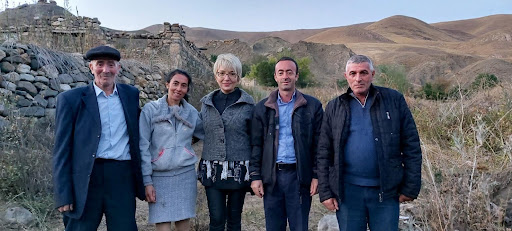
- His friends say that he was also a cheerful person.
- He was extremely funny and playful. He made everyone laugh and made them happy. They asked how he felt, and he answered: “The best!” Once we wore national clothes, now we wear foreign costumes. We used to light candles, now we have electricity. We lit the stove and couldn't see each other because of the smoke in the house. Now there is an electric stove. Now all conditions are good. He was such a person…
When our car drives up to the village of Bashlybel, he falls silent. Silently looking at the destruction, he orders the driver to drive through the village. When we leave the village and reach the foot of Delidag, we get out of the car. There is no highway from here. With quick steps he descends the mountain and crosses the river. I follow him, his steps so abrupt that it is impossible to reach him. When I try to cross the river, he already reaches the top of the mountain in front of me and disappears into the fields…
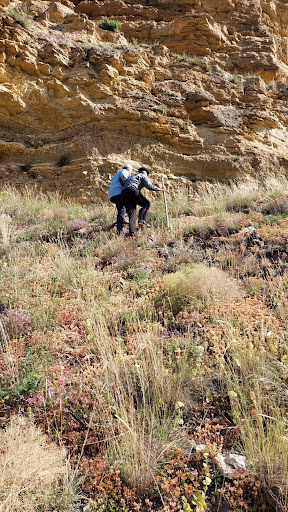
... When I approached him, he was sitting in front of the cave, leaning his hand on a tree... His eyes were full of tears, his lips were trembling. I move closer and sit on the rock next to him. I can't help but be surprised when I see a glass next to me:
- My God… This glass has been here for 28 years now…
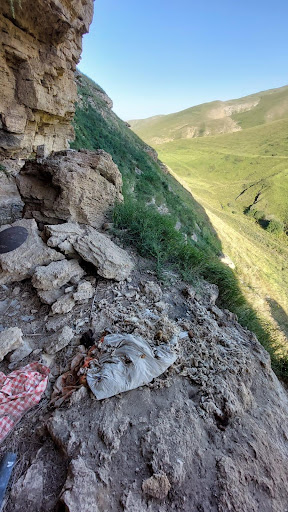
- Children's clothes and toys are also left in the cave ... I went in and looked ... But there are no traces of my father at all ... For 28 years I have not lost hope that I will find a trace of my father in these caves. Because they were our hope and refuge in the most difficult days. In 1993, we were at home when we learned that Kalbajar was occupied. We did not believe ... How? The villagers were heading to Murovdag. Father took us and came here to Barutlu. "Let's wait here for a few days and see if it's calm, and then we'll go back home," he said. Thus, we took refuge with 62 people and began to inspect the village. We saw with our own eyes how Armenian soldiers entered the village, how they plundered our country, how they set fire to houses... They drove cattle in front of them, and loaded things onto trucks... We understood that it was impossible to return…
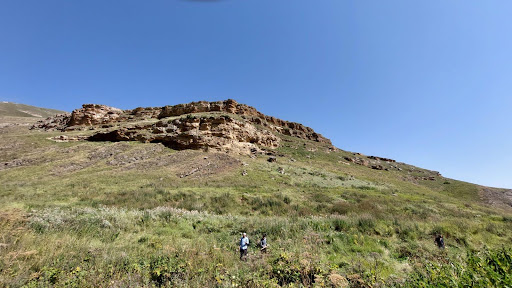
- However, it was not easy to go to Murov with women, children and the elderly …
- Indeed, it was a collision with death. We were under siege... For a while we lived secretly in caves. The Armenian armed forces identified the place where we were hiding and attacked on the evening of April 18th. 12 out of 62 people were brutally killed, 14 people were taken hostage. We managed to escape and hide in the upper ditches. My late wife was wounded in both hands. My children and I received shrapnel wounds from thrown grenades…
- And your life in the blockade lasted exactly 113 days …
- We have gone through very difficult days. In preparation for the exit from the siege, my father gave everyone his advice. What to take on the road, what to do? When we started to leave in the morning, he said: “I will stay here!” At first, we did not understand how it was “stay here”? “You are leaving, but I will not leave my homeland,” he said. “When I was thrown from war to war in distant countries, I was supported by the desire to return to my village. Now no war can separate me from my homeland. After this age, I cannot leave the land where all my descendants sleep!” We all begged… But couldn't persuade him…
- So you had to leave...
- It is not easy to leave your native land. Moreover, if you leave your own father still alive... (Crying) My father had a strange mystique. He kissed us all, charmed and sent away. He said: “Go, and you will safely get out of the siege. On the way you will meet Armenian soldiers, but they will not see you, I feel there will be an invisible veil between you.” And so it happened ... After a few days of travel, we learned that we were heading to their post. But we managed to avoid them...
- When he said goodbye, didn't he tell anything else?
- No matter how strange it may sound, "one day you will safely return here again," he said, and here I am again with the children, returned back to my village, to Barutlu …
His son Habil joins the conversation:
- Only one did not come true. He said, "I'll meet you here." Father, get up. Get up, let's go look in the Nabi cave... Maybe we could find some trace there. He couldn't have gone anywhere else. My grandfather got all his power from these mountains. He stayed in these mountains forever…
- Habil, what do you remember about the day when you parted with your grandfather?
- My grandfather was a very cheerful person. Even during the blockade, in those difficult days, he gathered us together and talked. When he spoke, as if the sun was being born, a light of hope appeared. Now I understand what my father went through. When I remember the day when we parted with grandfather, I melt like a candle ... On July 17, 1993, we said goodbye to grandfather. The last time I passed the stone at that turn, I turned around and saw that my grandfather was watching us. I looked at the clock on my hand, it was 20 minutes to 8. That is, that minute, that moment, that hour is now before my eyes. He stood in front of his Barutlu cave and looked at our back until he disappeared from view, saying goodbye to us with his pose and look ... This is the last portrait of my grandfather in my memory …
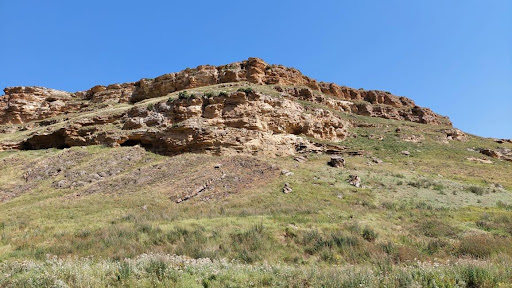
On the way up to the Nabi cave, he turned around. He sadly looked at the village of Bashlibel, which had turned into ruins, and said:
- My father saw this day. He described everything so well…
- What did he tell?
- In 1985, some ungrateful people acted unfairly towards my father. He did not complain to any state body. He said: "I complain to Allah." Allah punished those people in such a way that the whole village felt it. At the time when all the groups came to visit him, the father said to them: “In less than 10 years, this village will be destroyed and turn into ruins. Only I will stay here!” In just 8 years, his words came true... The population left, the village was destroyed, and only my father remained here…
The General Prosecutor's Office of the Republic of Azerbaijan continues the search for Kazimov Alesker Alesker oglu. Alekper Sonmez and his son Khabil Aleskerov are also participating in the search.
Author: Vusala Mammadova
As of December 1, 2020, the number of registered missing people is 3,890, according to the Working Group of the State Commission on the Affairs of Captured and Missing Persons.
There is a need for clarifying materials about the specific circumstances and battles in which these people went missing, or information that could at least shed some light on their subsequent fate. A new Media Development Center project called “Our Missing: Each of 4,000” provides for the preparation of journalistic investigations, in which the circumstances of the individual or collective disappearances of these people are described in detail from the language of eyewitnesses, as well as on the basis of information from official sources, are translated into several languages and distributed.
Thus, "Pressklub.az" starts a series of articles within the framework of the "Missing" project, presented by the well-known journalist Vusala Mammadova.
Returning to the lands liberated from occupation, a person first of all turns to the house where he was born and raised. It is such an inexplicable feeling that a place of which there is nothing left is called home. You sit on dry ground and say "I'm home"…
However, there are people who, having returned home, wander everywhere in the hope of finding not only the place of their home, but at least one single sign of their relative left here. These are the families of the missing. In this project, we will get to know these families, learn about our people who went missing in the First Karabakh War, and try to create the last portrait of our compatriots, whose fate has not yet been revealed.
My first interviewee, 74-year-old poet Alekper Sonmez, began the conversation by describing his father, Alesker Kazymov.

- I do not have a photograph of my father, but he is in my memory, as if alive! I would like you to look through my eyes and see what kind of person he was. He was tall, about 180-190 cm. With a broad back, weighing about 80 kg. He was dark-haired, he had small brown eyes, sparse gray hair ... He had a mustache, but he did not grow a beard ... A sloping chin, nose, ears, arms, legs ... Yes, my father had long legs, he took big steps. When he came from far away, everyone in the village would recognize him by his walk... His white dentures were a bit too big for his mouth. He mainly used his right hand. I don't know his blood type... He had no scars, no wounds, no tattoos, no birthmarks. I told all this to government agencies and international organizations …
- How old was your father? In some documents it is written that he was born in 1918, in others - in 1899 …
- Although it is written differently in the documents, my father Kazymov Alesker Alesker oglu himself said that he was born in the village of Bashlybel of the Kalbajar region in 1902. Studied for 7 years in high school. At that time there was no collective farm, he was engaged in his own farming.
- He also took part in the war…
- Yes, my father was called up for military service in 1938 from the military commissariat of the Lachin region. He did his military service in Ukraine. He was in the cavalry, that is, a mounted soldier. When the Soviet Union attacked eastern Poland in September 1939, my father was also in the war. Then he participated in the Winter War - the Soviet-Finnish war. After the end of the war, he was demobilized from the army and returned to his native village of Bashlybel.
- But then he again participated in the war.
- In 1941, the Great Patriotic War began. On December 18, my father was drafted into the army from the Kalbajar military commissariat. He was an active participant in the Great Patriotic War. After the end of the war, he returned to the village and took up construction on the collective farm. My father was one of the most active participants in the opening of the Istisu-Terter road. At that time there were no machines, manual labor was used for sowing and harvesting grain. According to his own words, during the day he cut and tied 250 armfuls of grain ...
- What did he tell about the war?
- My father was such an honest man that... He told me many memories of those days. I will never forget one of them…
- Could you tell me too?
- Of course! He said that one evening, returning to the barracks, he saw a wallet fall on the floor, and picked it up. When he went to bed in the evening, he opened it and saw that there was a lot of money, a military ID and a family photo. He learned that it was a soldier. But what to do? How does he know who it is? He thought that if he placed an ad, the owner would be found. He wrote an ad on a piece of paper, took it and pasted it on the doors of the dining room and the barracks. When he returned, he saw that it had been torn off. He wrote again, and the ad was torn down again. Thus, he wrote and pasted ads on the door for almost two months.
One evening he heard a call: “Kyazymov Alesker!” He was taken to the commander. There one person spoke Azerbaijani. He asked, “Brother, why do you annoy people? What do you hang on the door every day? Because of this, I drove here for three days. They called me to come and ask, what is your request? What do you want?"
The father said: "I found such an object, I want to deliver it to the owner." He replied: “Brother, you raised not only us, but the whole of Azerbaijan in the eyes of the people here. Well done!"
- After that, it became easier to find that soldier.
- Father said that on the same day the soldier was found and called, and he himself was thanked. They asked if he needed anything. My father said that he had great difficulties with the Russian language. He didn't understand a word. The Azerbaijani said: "Bring a piece of paper and a pen, I will tell you a few words, so you will learn everything." He wrote on paper "what is it called". He said to learn these words, and when it is difficult, point to an object and ask, then they will tell you that this is a spoon, this is a knife, this is bread …
- Just think, our ancestors had to defend the "motherland", the language of which they did not know …
- Yes. He learned the language during the war. He said that he learned everything very well ... My father was a very generous person. He gave cattle to those who had no cattle, and horses to those who had no horses.

- His friends say that he was also a cheerful person.
- He was extremely funny and playful. He made everyone laugh and made them happy. They asked how he felt, and he answered: “The best!” Once we wore national clothes, now we wear foreign costumes. We used to light candles, now we have electricity. We lit the stove and couldn't see each other because of the smoke in the house. Now there is an electric stove. Now all conditions are good. He was such a person…
When our car drives up to the village of Bashlybel, he falls silent. Silently looking at the destruction, he orders the driver to drive through the village. When we leave the village and reach the foot of Delidag, we get out of the car. There is no highway from here. With quick steps he descends the mountain and crosses the river. I follow him, his steps so abrupt that it is impossible to reach him. When I try to cross the river, he already reaches the top of the mountain in front of me and disappears into the fields…

... When I approached him, he was sitting in front of the cave, leaning his hand on a tree... His eyes were full of tears, his lips were trembling. I move closer and sit on the rock next to him. I can't help but be surprised when I see a glass next to me:
- My God… This glass has been here for 28 years now…

- Children's clothes and toys are also left in the cave ... I went in and looked ... But there are no traces of my father at all ... For 28 years I have not lost hope that I will find a trace of my father in these caves. Because they were our hope and refuge in the most difficult days. In 1993, we were at home when we learned that Kalbajar was occupied. We did not believe ... How? The villagers were heading to Murovdag. Father took us and came here to Barutlu. "Let's wait here for a few days and see if it's calm, and then we'll go back home," he said. Thus, we took refuge with 62 people and began to inspect the village. We saw with our own eyes how Armenian soldiers entered the village, how they plundered our country, how they set fire to houses... They drove cattle in front of them, and loaded things onto trucks... We understood that it was impossible to return…

- However, it was not easy to go to Murov with women, children and the elderly …
- Indeed, it was a collision with death. We were under siege... For a while we lived secretly in caves. The Armenian armed forces identified the place where we were hiding and attacked on the evening of April 18th. 12 out of 62 people were brutally killed, 14 people were taken hostage. We managed to escape and hide in the upper ditches. My late wife was wounded in both hands. My children and I received shrapnel wounds from thrown grenades…
- And your life in the blockade lasted exactly 113 days …
- We have gone through very difficult days. In preparation for the exit from the siege, my father gave everyone his advice. What to take on the road, what to do? When we started to leave in the morning, he said: “I will stay here!” At first, we did not understand how it was “stay here”? “You are leaving, but I will not leave my homeland,” he said. “When I was thrown from war to war in distant countries, I was supported by the desire to return to my village. Now no war can separate me from my homeland. After this age, I cannot leave the land where all my descendants sleep!” We all begged… But couldn't persuade him…
- So you had to leave...
- It is not easy to leave your native land. Moreover, if you leave your own father still alive... (Crying) My father had a strange mystique. He kissed us all, charmed and sent away. He said: “Go, and you will safely get out of the siege. On the way you will meet Armenian soldiers, but they will not see you, I feel there will be an invisible veil between you.” And so it happened ... After a few days of travel, we learned that we were heading to their post. But we managed to avoid them...
- When he said goodbye, didn't he tell anything else?
- No matter how strange it may sound, "one day you will safely return here again," he said, and here I am again with the children, returned back to my village, to Barutlu …
His son Habil joins the conversation:
- Only one did not come true. He said, "I'll meet you here." Father, get up. Get up, let's go look in the Nabi cave... Maybe we could find some trace there. He couldn't have gone anywhere else. My grandfather got all his power from these mountains. He stayed in these mountains forever…
- Habil, what do you remember about the day when you parted with your grandfather?
- My grandfather was a very cheerful person. Even during the blockade, in those difficult days, he gathered us together and talked. When he spoke, as if the sun was being born, a light of hope appeared. Now I understand what my father went through. When I remember the day when we parted with grandfather, I melt like a candle ... On July 17, 1993, we said goodbye to grandfather. The last time I passed the stone at that turn, I turned around and saw that my grandfather was watching us. I looked at the clock on my hand, it was 20 minutes to 8. That is, that minute, that moment, that hour is now before my eyes. He stood in front of his Barutlu cave and looked at our back until he disappeared from view, saying goodbye to us with his pose and look ... This is the last portrait of my grandfather in my memory …

On the way up to the Nabi cave, he turned around. He sadly looked at the village of Bashlibel, which had turned into ruins, and said:
- My father saw this day. He described everything so well…
- What did he tell?
- In 1985, some ungrateful people acted unfairly towards my father. He did not complain to any state body. He said: "I complain to Allah." Allah punished those people in such a way that the whole village felt it. At the time when all the groups came to visit him, the father said to them: “In less than 10 years, this village will be destroyed and turn into ruins. Only I will stay here!” In just 8 years, his words came true... The population left, the village was destroyed, and only my father remained here…
The General Prosecutor's Office of the Republic of Azerbaijan continues the search for Kazimov Alesker Alesker oglu. Alekper Sonmez and his son Khabil Aleskerov are also participating in the search.
Author: Vusala Mammadova
The article was prepared within the framework of the project "Missing Persons: each of 4000", carried out with the financial support of the Agency for State Support of Non-Governmental Organizations of the Republic of Azerbaijan.
The opinions reflected in the article belong to the author and may not coincide with the official position of the Agency for State Support of Non-Governmental Organizations of the Republic of Azerbaijan.






